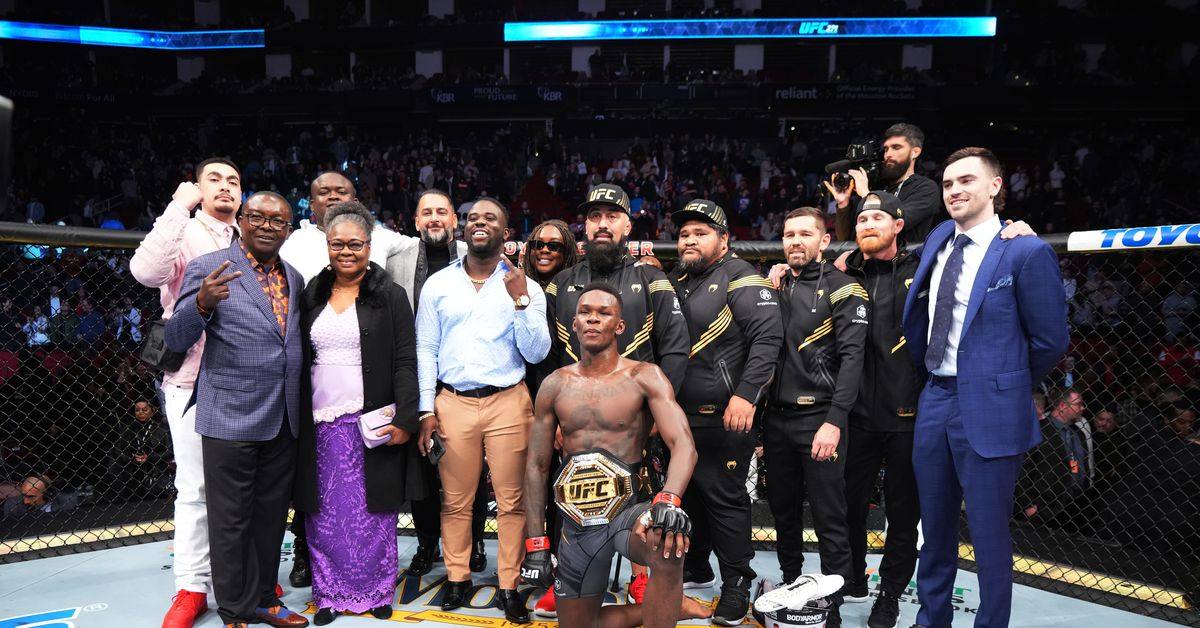It’s a rarity these days when any athletic commission actually releases fighter pay information. And there’s no transparency on MMA athletes’ salaries beyond what’s made available by a few states.
Unlike other major sports leagues like the NFL or NBA, where pay disclosures and contract details are always revealed, there’s no such disclosure for fighters competing in the UFC, Bellator MMA or any other top MMA organization.
Israel Adesanya’s manager, Tim Simpson, who works with Paradigm Sports — the same agency representing prominent fighters such as Conor McGregor and Cris Cyborg — would like to see that change because it would only benefit fighters across the sport.
“I think it should always be disclosed,” Simpson told The MMA Hour. “You take the Israel and Conor examples aside, I think sports-wide if every UFC salary was disclosed, it’s going to create more unity, more leverage for the fighter. That’s all I care about is leverage for the fighter.
“I would love to know when I’m negotiating for someone who’s not Israel, here’s a relevant [comparison], I think it would make things so much faster.”
Of course, Simpson acknowledges it’s a lot harder to determine value in MMA versus other sports, where everything revolves solely around performance and skill on the field or court. In a promotion such as the UFC, wins and losses still matter, but an athlete’s ability to drive viewership and attention can make a huge difference when determining value for a contract.
“It’s not the same as the NBA and NFL, right, because the [comparisons] are more accurate because you don’t need to sell tickets necessarily,” Simpson explained. “Combat sports is so different. It’s like 50 percent your athletic side, 50 percent you’re putting asses in seats. Being the brand, being a prizefighter. I think in the stick and ball sports, it’s not so much that so the [comparisons], you can look at how many rebounds, how many points, how many assists, compare that to another guy who plays this [many] minutes and you can almost get [comparisons] that way.
“Fighting is not that linear. You can take this guy who has won this many fights in the UFC or this many fights in the UFC but they could be completely different pay scales because one guy is a Bobby Green, who’s got a brand and another guy, whoever it may be. So in that sense the [comparisons] aren’t going to be perfect but I think there would be no harm in giving those numbers to everybody, even if it’s not public.”
Even when athletic commissions reported disclosed salaries, those figures never included additional bonuses paid from pay-per-view, or discretionary bonuses handed down by the various promotions.
UFC President Dana White has argued vehemently against revealing fighter pay because he claims the athletes don’t want anybody to know how much they’re actually making. Simpson feels differently because that kind of information could only better serve athletes at every level of the sport.
“I’ve heard arguments ‘nobody wants the pay disclosed cause nobody wants to know how much everyone’s making,’” Simpson said. “I hear that but I don’t think that hurts LeBron James. Athletes can deal with that.
“I think yes, that’s relevant and if any fighter feels that way, I totally respect it but I feel for the good of the whole sport if it were disclosed, not publicly even, just like an internal database, it would benefit all fighters.”
When it comes to the larger discussion about fighter pay in MMA, Simpson acknowledges that while some athletes are very happy with the amount of money they are making, that doesn’t necessarily mean everybody is being compensated fairly.
The UFC in particular has been hit hard with complaints over fighter pay thanks to information released from an ongoing class action lawsuit that revealed how the promotion has typically only paid out around 16 to 20 percent of total revenue to the athletes.
Meanwhile, in other sports like professional football or basketball, the compensation is right around 50 percent with powerful player unions ensuring that the athletes are still taking home a fair amount through collective bargaining agreements.
Nothing like that exists in MMA, so it’s largely every man or woman for themselves.
“Objectively, again I don’t want this that I came on here to bash the UFC, but of course I think all fighters should get paid more,” Simpson said. “I’m not a financial expert. I can’t look at the UFC’s numbers and say ‘this is where they could do it.’ We have people on our staff that are better than me at that but from my basic financial understanding and from the numbers I’m aware of, it appears there is more room to pay fighters more.
“You take Israel for example, he’s happy. I’m sure other fighters are happy. Even when I started seven years ago, the base payment has come up. Audie [Attar] talked about when he started out in MMA, guys were starting at like $2,500 [to show] and $2,500 [to win], something like that and now the minimum is like [$10,000] and [$10,000] or [$12,000] and [$12,000], something like that. So it has improved but has it improved enough? I don’t believe so but change will come. I believe.”


